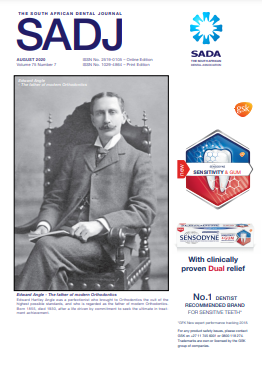Dental students' self-perceived competency and usage of the internet for learning and evaluation purposes - Part 2
DOI:
https://doi.org/10.17159/2519-0105/2020/v75no7a5Keywords:
online learning, training, dental studentsAbstract
Many dental lecturers are moving away from providing hand-out notes to their students and are rather opting for posting lecture material and tutorials on the internet using the various university platforms such as clickUP. At the same time a number of students have queried the need to purchase the prescribed text books due to their high costs, and dated content. The presumption is that all students have unrestricted and equal access to this material, and are competent using digital technology for learning and assessment, however there has been no formal investigation into whether this is so. Student access and usage was reported on in Part I of this study. The present paper investigated students' preferences with regards to the mode of learning material, and their self-perceived competencies in using the internet for various academic purposes. The project took the form of an anonymous, structured questionnaire that was given to all dental students from the second to the fifth year of study. Results revealed that over 90% of the students feel competent to access and use internet search engines for research and assignments, to connect with friends, and to download or watch videos. Slightly less (between 70-90%) were confident using it for independent research, learning from lecture material, using e-dictionary, carrying out searches to learn extra material, completing short quizzes and assignments, or undertaking independent learning and reading. Almost all students needed to access the internet on a daily or weekly basis for work related issues, yet at least 40% reported to not being able to do so at times or in venues that suited their programs. Lecturers need to be aware of this to ensure these students are not disadvantaged in comparison to their peers if they do not submit requisite material on time. The university has pledged their commitment towards changing traditional teaching methods and embracing more blended learning platforms, as well as to helping students make up for the lost time due to the Corona virus pandemic. However, now more than ever they need to work together to ensure that all students have the necessary skills and technology needed to use the online platforms, and to provide the necessary tuition and changes if they wish to be truly committed to the well-being and education of their students.
Downloads
References
Panigrahi R, Srivastava PR, Sharma D. Online learning: Adoption, continuance, and learning outcome-A review of literature. International Journal of Information Management. 2018 Dec 1; 43: 1-4.
Tsai CW. Applying online competency-based learning and design-based learning to enhance the development of students' skills in using PowerPoint and Word, self-directed learning readiness, and experience of online learning. Universal Access in the Information Society. 2018 Nov 1; 1-2.
Ng'ambi D, Brown C, Bozalek V, Gachago D, Wood D. Technology enhanced teaching and learning in South African higher education-A rear-view of a 20 year journey. British Journal of Educational Technology. 2016 Sep; 47(5): 843-58.
Dogruera N, Eyyamb R, Menevis I. The use of the internet for educational purposes. Social and Behavioural Sciences. 2011; 28: 606-11.
Charp C. The millennium classroom. The Higher Education Journal. 2000; 27(10): 10-12.
Ciglaric M, Vidmar T. The use of Internet technologies for teaching purposes. European Journal of Engineering Education. 1998; 23(4): 497-503.
Huang RH, Liu DJ, Tlili A, Yang JF, Wang HH. Handbook on Facilitating Flexible Learning During Educational Disruption: The Chinese Experience in Maintaining Undisrupted Learning in COVID-19 Outbreak. Beijing: Smart Learning Institute of Beijing Normal University. 2020.
Barak M, Hussein-Farraj R, Dori YJ. On-campus or online: examining self-regulation and cognitive transfer skills in different learning settings. International Journal of Educational Technology in Higher Education. 2016 Dec; 13(1): 35.
Adam NL, Alzahri FB, Soh SC, Bakar NA, Kamal NA. Self-regulated learning and online learning: a systematic review. In International Visual Informatics Conference. 2017 Nov 28; 143-154.
Sweller J, van Merriënboer JJ, Paas F. Cognitive architecture and instructional design: 20 years later. Educational Psychology Review. 2019 Jan 22; 1-32.
Aharony N, Gazit T. Students' information literacy self-efficacy: An exploratory study. Journal of Librarianship and Information Science. 2020 Mar; 52(1): 224-36.
Burns RA, Crisp DA, Burns RB. Competence and affect dimensions of self-concept among higher education students: a factorial validation study of an academic subject-specific self-concept. European Journal of Psychology of Education. 2018 Oct 1; 33(4): 649-63.
Bradley RL, Browne BL, Kelley HM. Examining the influence of self-efficacy and self-regulation in online learning. College Student Journal. 2017 Dec 1; 51(4): 518-30.
McKenney S, Reeves TC. Conducting educational design research 2nd ed. Routledge. 2018.
Cornelia RM, Fluit D, Bolhuis S, Grol R, Laan R, Wensing M. Assessing the Quality of Clinical Teachers. A Systematic Review of Content and Quality of Questionnaires for Assessing Clinical Teachers. J Gen Intern Med. 2010; 25(12): 1337-45.
Lalla RV, Li EY, Huedo-Medina TB, MacNeil RL. Evaluation of an Experiential and Self-Learning Approach to Teaching Evidence-Based Decision Making to Dental Students. Journal of dental education. 2019 Oct 1; 83(10): 1125-33.
Gorbunovs A, Kapenieks A, Cakula S. Self-discipline as a key indicator to improve learning outcomes in e-learning environment. Procedia-Social and Behavioral Sciences. 2016 Oct 5; 231: 256-62.
Carlson ER. Lifelong Learning: A Higher Order of Consciousness and a Construct for Faculty Development. Journal of Oral and Maxillofacial Surgery. 2019 Oct 1; 77(10): 1967-e1.
Nentwich M. Cyberscience - Research in the age of the Internet. Austrian Academy of Science Press, editor. Vienna. 2003.
Burgess J. Blogging to learn, learning to blog. Use of Blogs. Bruns A, Jacobs J, editor. New York: Peter Lang; 2006.
Snell L, Tallett S, Haist S, Hays R et al. A review of the evaluation of clinical teaching: New perspectives and challenges. Med Educ. 2000 Oct; 34(10): 862-70.
Downloads
Published
Issue
Section
License
Copyright (c) 2021 Leanne M Sykes, Thomas C Postma, André Uys, Paul Brandt, Elmine Crafford

This work is licensed under a Creative Commons Attribution-NonCommercial 4.0 International License.





.png)